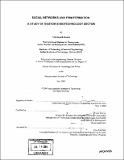| dc.contributor.advisor | Fiona Murray. | en_US |
| dc.contributor.author | Kanda, Vishwanath, 1975- | en_US |
| dc.contributor.other | Massachusetts Institute of Technology. Technology and Policy Program. | en_US |
| dc.coverage.spatial | n-us-ma | en_US |
| dc.date.accessioned | 2005-09-06T21:17:16Z | |
| dc.date.available | 2005-09-06T21:17:16Z | |
| dc.date.copyright | 2004 | en_US |
| dc.date.issued | 2004 | en_US |
| dc.identifier.uri | http://hdl.handle.net/1721.1/27011 | |
| dc.description | Thesis (S.M.)--Massachusetts Institute of Technology, Engineering Systems Division, Technology and Policy Program, 2004. | en_US |
| dc.description | Includes bibliographical references (leaves [57]-58). | en_US |
| dc.description.abstract | This research focuses on two specific research problems in the context of innovation in the biotech industry. These research problems map to the two phases of innovation process--creation of new scientific expertise (Phase I) and commercialization of that new expertise (Phase II). The research problem in Phase I, examines determinants of productivity in the creation of new scientific expertise, specifically following scholarship in the sociology of networks, assessing the impact of patterns of scientific research networks on research productivity. The setting for the study is a group of research scientists associated with the Du Pont-MIT Alliance. Findings suggest that optimal research networks should have a large number of relatively strong links and avoid over-dependence on a few research collaborators, to enhance research productivity. With respect to Phase II and the transformation of scientific ideas into commercial products, existing innovation literature has identified several ingredients for commercial success, and in particular, for start-up ventures: reputed management teams, BODs (Board of Directors), SABs (Scientific Advisory Boards) and prominent VC (venture capital) firms. However the relative influence of the inventor's reputation versus the quality of the research idea in assembling these necessary constituents has not been researched. The study sample for the research problem under Phase II, consisted of all the biotech start-ups in the Massachusetts area, founded after 1995. The research findings highlight the usage of 'signaling' (reputation in this case) in assembling reputed teams. The study also shows diminishing returns to such signaling as the uncertainty reduces. The implications of these finding can be broadly drawn | en_US |
| dc.description.abstract | (cont.) at the level of technology policy and at the unit level of a firm. Technology policy can influence the organization of university research networks as well as make funding allocation decisions. Individual firms can use these results to shape their collaboration with academia. The results also send a strong signal that if a research idea attains prominence, it can be successfully commercialized regardless of the inventor reputation. | en_US |
| dc.description.statementofresponsibility | by Vishwanath Kanda. | en_US |
| dc.format.extent | 58 leaves | en_US |
| dc.format.extent | 2742209 bytes | |
| dc.format.extent | 2747396 bytes | |
| dc.format.mimetype | application/pdf | |
| dc.format.mimetype | application/pdf | |
| dc.language.iso | en_US | |
| dc.publisher | Massachusetts Institute of Technology | en_US |
| dc.rights | M.I.T. theses are protected by copyright. They may be viewed from this source for any purpose, but reproduction or distribution in any format is prohibited without written permission. See provided URL for inquiries about permission. | en_US |
| dc.rights.uri | http://dspace.mit.edu/handle/1721.1/7582 | |
| dc.subject | Technology and Policy Program. | en_US |
| dc.title | Social networks and firm formation : a study of Boston's biotechnology sector | en_US |
| dc.type | Thesis | en_US |
| dc.description.degree | S.M. | en_US |
| dc.contributor.department | Massachusetts Institute of Technology. Engineering Systems Division | |
| dc.contributor.department | Technology and Policy Program | |
| dc.identifier.oclc | 56726157 | en_US |
